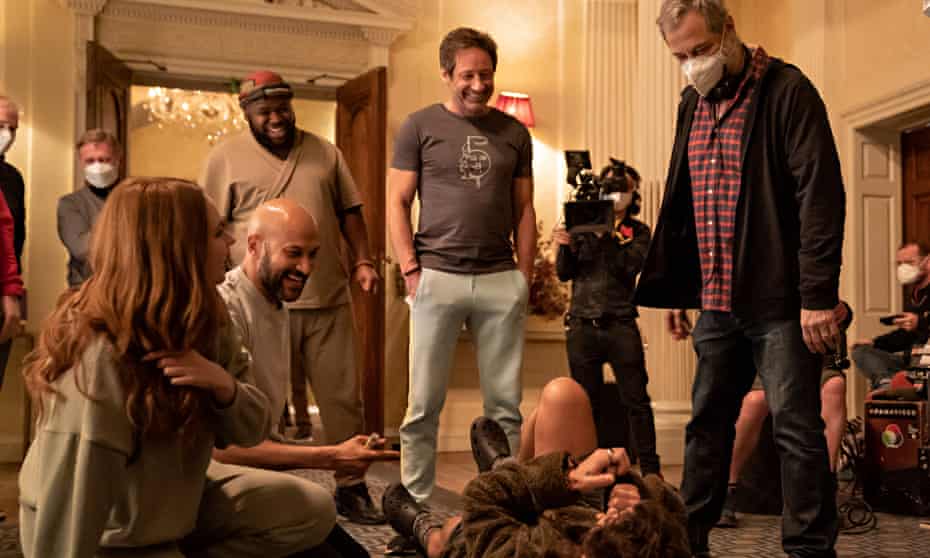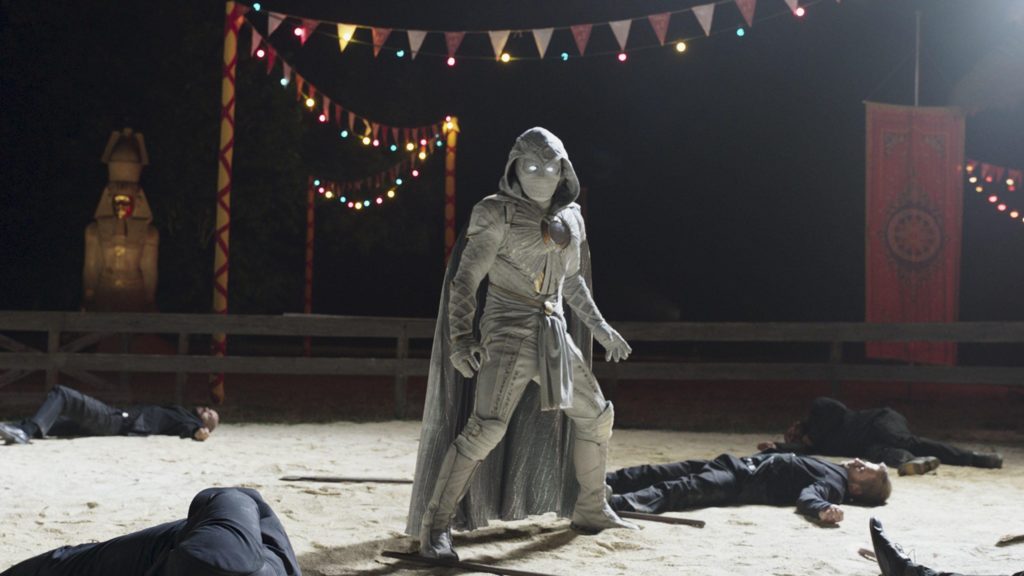 I suspect most of you will assume I didn’t like The Bubble. Most of you would be correct. However, I don’t think The Bubble is as bad as some people are saying it is. Once it hits its groove and understands what it is, it’s not bad. The problem is it takes too long to get there.
I suspect most of you will assume I didn’t like The Bubble. Most of you would be correct. However, I don’t think The Bubble is as bad as some people are saying it is. Once it hits its groove and understands what it is, it’s not bad. The problem is it takes too long to get there.
The movie starts off as a commentary on the pandemic, which doesn’t work because while the intention was to parody something we all went through and therefore be “relatable,” it only parodies a unique subset of the pandemic – that of trying to make a movie.
I don’t know anyone who had the problem of being quarantined in a hotel with a bunch of charismatic people while they got paid millions of dollars. It was too specific of a parody so many of the pandemic jokes didn’t work. For example, I didn’t have to get tested every other day during the pandemic. So that’s not funny to me.
However, once the narrative shifts to the studio trapping the actors until they finish their movie, the movie actually gets kind of funny. For example, there’s this big climactic scene where the actors make a run for it and get into a helicopter, which is their only way to freedom.
In every action movie, getting in a helicopter and flying off while being attacked from all sides is a foregone conclusion. But in this movie, where a lone actor knows how to fly helicopters via his 8 movie-prep lessons, the team rises off the ground before they find out that the actor has only ever learned how to go up and down. So the big climactic moment is simply: can he figure out how to go forward so they can leave?
Despite its weaknesses, it’s a movie worth discussing if only because Judd Apatow is the biggest comedy director in the world. So if Judd Apatow miscalculates, it’s worth asking why, so we can learn from it.
Judd made two risky choices that may have done The Bubble in. The first is that he abandoned any emotional through-line in the screenplay, which has been one of his staples. For example, in his last film, The King of Stanten Island, there’s this really deep surrogate father-son relationship between the main character and his mom’s new boyfriend.
As I’ve argued many times here on the site, if we don’t feel any emotional connection to the characters, we don’t feel like they’re real. So when they get into trouble, we don’t fear for them. And without that fear, every joke that highlights their misfortunes is paper-thin, since we know it doesn’t matter.
Judd has been forthright about this. In his Barstool Sports interview, he said that this was a new challenge for him, writing a pure comedy, where all you care about is the jokes. I got the sense that he began freaking out about this choice towards the end of the movie as the sudden third-act focus on character emotion felt like an overcorrection, an attempt to remedy his mistakes from earlier.
The other mistake Judd made was he didn’t have a main character. I remember about 30 minutes into the movie feeling like I’d met 50 people and knew none of them. We’re bouncing around so much that we never get attached to anyone. If you look at Judd’s most popular movies – films like The 40 Year Old Virgin, Knocked Up, even Trainwreck – they’re almost aggressively one-character movies.
When you focus on one character, you can dive into who that person is, what makes them tick, what their flaws are, what their vices are, what their relationships are like. And we just didn’t get any of that in The Bubble.
There’s a moment late in the script where the closest thing that Judd has to a main character, Carol (Karen Gillan), seeks out help from Sean Knox (Keegan-Michael Key). In the scene, Carol, who’s losing her mind, wants to know how Sean, who’s a major movie star, is able to stay so positive.
This was about 80 pages into the screenplay, mind you, and it was THE FIRST TIME I was aware that Sean Knox was a major movie star. I had no idea. That was par for the course here. This choice to follow everyone instead of someone prevented us from knowing anyone.
Here’s a tip. Whenever you’re trying to decide who your main character should be, ask yourself who has the most to lose? Who has the most on the line? That person should probably be your hero.
In Juno, it isn’t Juno’s boyfriend who has the most on the line. It isn’t her parents. It isn’t her friend. It isn’t even the family she’s going to give the baby to. It’s her. She has the most on the line. She’s pregnant. What she does affects, literally, the rest of her life.
To that end, the main character in The Bubble probably should’ve been the director, Darren, played by Fred Armisen. He seemed to have the most to lose. This was his big studio shot and it just happened to come at the most restrictive time for movie production in history.
Trying to make a good movie under those conditions must have felt like an insurmountable task. But since we only kind of knew Darren, we never felt any compassion when the movie began slipping through his fingers.
Comedy continues to be an extremely frustrating genre. How is that a genre whose faults are the easiest to dissect is also the hardest to execute?

Luckily, The Bubble isn’t the only new thing that dropped last week. We also got a new Marvel series, Moon Knight. I’d say, of the five Marvel shows that have come out so far – Wandavision, Falcon and Winter Soldier, Hawkeye, Loki, and now this – it’s probably the most anticipated considering it has the best actor and the least known story. Unlike the other shows, Moon Knight is a brand new character we haven’t met before. It’s exciting having a complete unknown for once.
The thing I will give Marvel is that between Wandavision, Loki, and now this, they are taking chances. I can’t sit here and complain that Hollywood never takes risks then ignore it when they do.
I have a lot of admiration for Marvel using these shows as a testing ground for unique storytelling, and not just making them bite-sized versions of their movies. Well, I guess Hawkeye and Winter Soldier are bite-sized versions. But three of these shows are still unique. And Moon Knight may be the most unique of all.
At the center of the story is this giant mystery. This museum worker, Marc, constantly blacks out, missing huge chunks of his life, which results in a daily routine where he’s just trying to get up to speed half the time. For example, a female co-worker asks him if they’re still on for their date Friday night. Except Marc does not remember asking this girl out.
These missing chunks of time are getting more volatile, though. Marc will find himself in the middle of a small village in a completely different country surrounded by cult-members and have no idea how he got there. When they sense Marc is an intruder, they attack him, only for Marc to black out, and when he regains consciousness, 20 people around him have been violently killed, and his hands are dripping with blood. This cult leader, Arthur, wants something Marc has, an Egyptian gold scarab (our macguffin), and he’ll do anything to get it.
The pilot is a great reminder of how influential POV (point-of-view) is to a story. Take The Bubble, for instance. The POV was 20 different characters. We saw the unfolding drama through enough eyes to get a 10,000 feet high look at what was happening.
Here, the POV is just one person, Marc. And because we’re in his head with him when these chunks of time keep disappearing, we feel the same fear he does. I remember, at one point, literally wondering, “Good God. Is this what being crazy feels like? Where you’re a slave to this illogical sequence of events that are constantly changing?” I don’t have that feeling without Marc’s singular POV.
Imagine if Moon Knight was told like The Bubble, where we saw Marc’s situation through ten other people. All that fear would be gone. Cause we’d know exactly what was happening. So POV is something every writer should consider when writing a script. WHO has the POV and HOW MANY people have the POV will have a dramatic effect on character, plot, theme, how you build suspense, where you find your conflict, everything.
The question will be, can Moon Knight keep its death-defying pace up? Presumably, our main mystery will be solved going forward. They already kind of answer it at the end of this episode. So will they simply move the mystery over to his Egyptian roots and what this Arthur villain is after? Or will they just have Moon Knight solving crime, a la Batman?
It’d be a shame if that were the case but this has been my issue with the 6-8 episode format, in general. It’s not quite a TV show. It’s not quite a movie. So nobody really knows what to do with it. We’re in that experimental phase and, so far, I’m not sure I’d call the phase a success. The only high-profile show I’ve seen nail it so far has been Peacemaker.
But I’m rooting for Moon Knight. It’s probably one of the coolest superhero costumes I’ve ever seen. And who doesn’t want to see more Oscar Isaac? Have you seen either Moon Knight or The Bubble? Let me know what you think!

